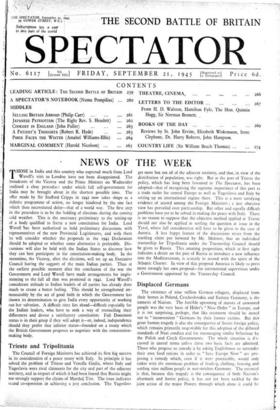Trieste and Tripolitania
The Council of Foreign Ministers has achieved its first big success in its consideration of a peace treaty with Italy. In principle it has solved the problem of Trieste and Veneria Giulia, where Italy and Yugoslavia were rival claimants for the city and part of the adjacent territory, and in respect of which it had been feared that Russia might too strongly support the claims of Marshal Tito. The issue indicates stand co-operation in achieving a just conclusion. The Yugoslays
get most but not all of the adjacent territory, and that, in view of the distribution of population, was right. But at the port of Trieste the policy, which has long been favoured in The Spectator, has been adopted—that of recognising the supreme importance of this port as a trade outlet for central Europe as well as Yugoslavia and Italy by setting up an international regime there. This is a most satisfying evidence of accord among the Foreign Ministers ; a just objective view has prevailed over partisanship. But other and equally difficult problems have yet to be solved in making the peace with Italy. There is no reason to suppose- that the objective method applied at Trieste should not also be applied in settling the question at issue in the Tyrol, where full consideration will have to be given to the case of Austria. A less happy feature of the discussions arises from the startling claim put forward by Mr. Molotov, that an individual trusteeship for Tripolitania under the Trusteeship Council should be given to Russia. This amazing proposition, which at first sight indicates a desire on the part of Russia to introduce a new influence into the Mediterranean, is scarcely in accord with the spirit of the Atlantic Charter. In view of this proposal America is likely to press more strongly her own proposal—for international supervision under a Government appointed by the Trusteeship Council.






















